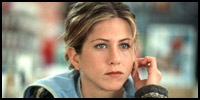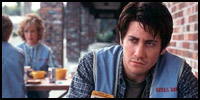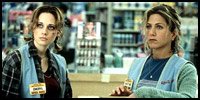
 |
The Good Girl (2002) Directed by Miguel Arteta Cast: Jennifer Aniston, Jake Gyllenhaal, John C. Reilly, Tim Blake Nelson, Mike White, Zooey Deschanel, Deborah Rush, John Carroll Lynch, John Doe, Roxanne Hart 2002 – 93 minutes Rated: Reviewed by Dustin Putman, August 24, 2002.  When everything clicks in the motion picture medium, movies hold an undeniable power. They can entertain, deeply involve, educate, and even force us to consider our own beings and the world around us. After the two hours are over and the lights come up, however, they remain just that: a movie. Beautifully directed by Miguel Arteta and written by Mike White (both of whom helmed 2000's "Chuck & Buck"), "The Good Girl" offers a little something more than what audiences are accustomed to. The flawlessly drawn characters that inhabit their oppressively ordinary Texas hometown in "The Good Girl" pop off the screen with such a rare accuracy and truthfulness that they cease being mere screenwriting creations. They, like you and I, never appear to be anything less than real, living-and-breathing people whose lives we put a personal stake in because we not only like them, but deeply sympathize and care about.
When everything clicks in the motion picture medium, movies hold an undeniable power. They can entertain, deeply involve, educate, and even force us to consider our own beings and the world around us. After the two hours are over and the lights come up, however, they remain just that: a movie. Beautifully directed by Miguel Arteta and written by Mike White (both of whom helmed 2000's "Chuck & Buck"), "The Good Girl" offers a little something more than what audiences are accustomed to. The flawlessly drawn characters that inhabit their oppressively ordinary Texas hometown in "The Good Girl" pop off the screen with such a rare accuracy and truthfulness that they cease being mere screenwriting creations. They, like you and I, never appear to be anything less than real, living-and-breathing people whose lives we put a personal stake in because we not only like them, but deeply sympathize and care about.
 On the part of Jennifer Aniston, her exquisitely modulated and heartbreakingly understated performance is a revelation. Aniston's Justine is so far removed from the chirpy character of Rachel Green she plays on TV's "Friends" that it takes all of thirty seconds to completely forget it is the same person. It has been no big secret that Aniston, in many ways, is the most talented and magnetic of the "Friends" ensemble, but until now, hadn't been given that one career-defining role that finally proved what she was made of. From her faultless Texas accent to her every facial expression and subtle choices in body language, Aniston has embodied Justine with all of the heart and soul needed to convey the internal suffocation and boredom of an unhappy 30-year-old woman who has sacrificed an education and possibly meaningful career in favor of a lifestyle she can't help but feel alienated in.
On the part of Jennifer Aniston, her exquisitely modulated and heartbreakingly understated performance is a revelation. Aniston's Justine is so far removed from the chirpy character of Rachel Green she plays on TV's "Friends" that it takes all of thirty seconds to completely forget it is the same person. It has been no big secret that Aniston, in many ways, is the most talented and magnetic of the "Friends" ensemble, but until now, hadn't been given that one career-defining role that finally proved what she was made of. From her faultless Texas accent to her every facial expression and subtle choices in body language, Aniston has embodied Justine with all of the heart and soul needed to convey the internal suffocation and boredom of an unhappy 30-year-old woman who has sacrificed an education and possibly meaningful career in favor of a lifestyle she can't help but feel alienated in.
 Justine Last (Jennifer Aniston) is an eternally unhappy woman with a job at the low-rent Retail Rodeo. Her tiresome, dead-end profession has left her feeling almost dead inside. Her seven-year marriage to Phil (John C. Reilly), a nice-guy house painter who spends his evenings on the couch watching television and getting high with best friend Bubba (Tim Blake Nelson), has fallen into a comfortable, but unexciting and mostly non-communicative, funk. Desperate to break the mold of her depressed existence, Justine is at a crossroad in her life where she is not sure whether to accept the cards life has dealt her or run toward the hills screaming.
Justine Last (Jennifer Aniston) is an eternally unhappy woman with a job at the low-rent Retail Rodeo. Her tiresome, dead-end profession has left her feeling almost dead inside. Her seven-year marriage to Phil (John C. Reilly), a nice-guy house painter who spends his evenings on the couch watching television and getting high with best friend Bubba (Tim Blake Nelson), has fallen into a comfortable, but unexciting and mostly non-communicative, funk. Desperate to break the mold of her depressed existence, Justine is at a crossroad in her life where she is not sure whether to accept the cards life has dealt her or run toward the hills screaming.
Her life is reinvigorated in the friendship and subsequent love affair she begins with her quiet and brooding 22-year-old co-worker, Holden (Jake Gyllenhaal). Justine tells Holden, who was forced to drop out of college after his drinking got out of hand, that she feels a rare bond with him because they both seem to hate the world. For Holden, their relationship means the world to him, and he unequivocally falls in love. Justine, on the other hand, isn't quite sure how she feels about Holden. She loves him, yes, but doesn't know in what way, or to what degree she was just using him as a plea for change. Further complicating matters is Holden's obvious mental problems and Bubba's eventual discovery of what Justine has been doing behind Phil's back.  To describe "The Good Girl" may make the film appear to be a strictly dark study in despair. What the premise can't hint at is just how boisterously funny the film is. While the picture is most definitely a character study, and a poignant drama at that, it also has a great deal of humor that is never forced or thrown in for a cheap laugh, but comes out of life's natural, everyday situations. Mike White's screenplay is a pointed and honest one with a sharp eye for even the most minuscule of details involved in one's human nature. Justine's co-worker, Cheryl (Zooey Deschanel), for example, prattles off outrageously coarse dialogue into her PA announcements in an attempt to break her job's monotony, while the clueless customers go about their business without flinching. When someone wishes the store's bible-thumping security guard, Corny (Mike White), a happy Halloween, he replies, "Oh, I don't practice paganism, but thanks anyway." This is undoubtedly the most genuinely funny film to come along in several months, even as we hurt alongside Justine.
To describe "The Good Girl" may make the film appear to be a strictly dark study in despair. What the premise can't hint at is just how boisterously funny the film is. While the picture is most definitely a character study, and a poignant drama at that, it also has a great deal of humor that is never forced or thrown in for a cheap laugh, but comes out of life's natural, everyday situations. Mike White's screenplay is a pointed and honest one with a sharp eye for even the most minuscule of details involved in one's human nature. Justine's co-worker, Cheryl (Zooey Deschanel), for example, prattles off outrageously coarse dialogue into her PA announcements in an attempt to break her job's monotony, while the clueless customers go about their business without flinching. When someone wishes the store's bible-thumping security guard, Corny (Mike White), a happy Halloween, he replies, "Oh, I don't practice paganism, but thanks anyway." This is undoubtedly the most genuinely funny film to come along in several months, even as we hurt alongside Justine.
 Aside from Jennifer Aniston's lovely performance, another reason why "The Good Girl" is such a special film is in the way director Miguel Arteta is able to surehandedly capture a glimpse of life that never appears manufactured or "written." The decisions Justine makes throughout the film, for better or worse, have a matter-of-fact bearing on much of what happens around her, and she is forced to deal with her actions in a wholly realistic manner. It certainly helps that Justine is an intelligent, free-thinking woman and, as played by Aniston, when she isn't speaking, you can see her thinking.
Aside from Jennifer Aniston's lovely performance, another reason why "The Good Girl" is such a special film is in the way director Miguel Arteta is able to surehandedly capture a glimpse of life that never appears manufactured or "written." The decisions Justine makes throughout the film, for better or worse, have a matter-of-fact bearing on much of what happens around her, and she is forced to deal with her actions in a wholly realistic manner. It certainly helps that Justine is an intelligent, free-thinking woman and, as played by Aniston, when she isn't speaking, you can see her thinking.
Fine-tuned character actors make up the rest of the cast, each one fitting into their roles like a well-worn glove. Jake Gyllenhaal (2001's "Donnie Darko," 2002's "Lovely & Amazing") is unforgettably disturbing and impassioned as the unbalanced Holden, who is willing to go to any lengths to run away with Justine. As Phil, John C. Reilly (2001's "The Anniversary Party") brings a touching authenticity to a potentially cliched part that never comes off as cliched. Phil, unlike Justine, has no real aspirations for his life other than what is already in front of him, and his own amiableness keeps him from recognizing his wife's quiet sorrow. Zooey Deschanel (2002's "Big Trouble" and "The New Guy") flavors Cheryl with her usual delightful brand of gleefully acid-tongued humor and truth.  The title, "The Good Girl," comes from Justine's yearning to be a responsible and respectable person, and there are several moments of unshakably thought-provoking narration in which she laments about where the many decisions she has made have lead her in her life. There is a brilliant sequence near the climax in which Justine sits in her car at a stoplight, closes her eyes, and debates on which way she will turn once the light turns green. Each way will lead her down a completely different path, and each has their own list of pros and cons. What her decision comes down to is not necessarily the path that will make her happier, but it will make her feel better about herself as a person. Not only is this Jennifer Aniston's most powerful turn to date, but "The Good Girl" is easily one of the year's very best motion pictures.
The title, "The Good Girl," comes from Justine's yearning to be a responsible and respectable person, and there are several moments of unshakably thought-provoking narration in which she laments about where the many decisions she has made have lead her in her life. There is a brilliant sequence near the climax in which Justine sits in her car at a stoplight, closes her eyes, and debates on which way she will turn once the light turns green. Each way will lead her down a completely different path, and each has their own list of pros and cons. What her decision comes down to is not necessarily the path that will make her happier, but it will make her feel better about herself as a person. Not only is this Jennifer Aniston's most powerful turn to date, but "The Good Girl" is easily one of the year's very best motion pictures.
©2002 by Dustin Putman |
 |













